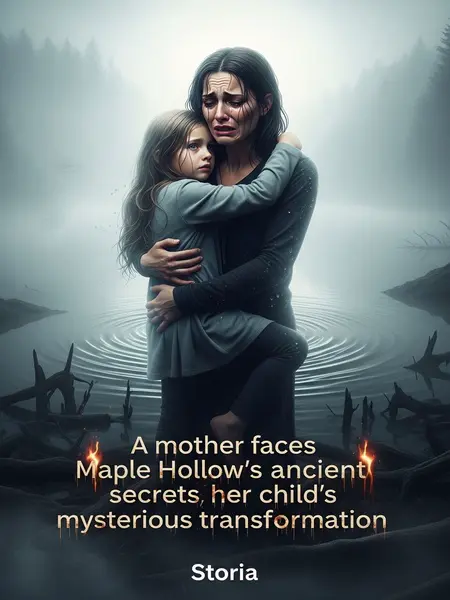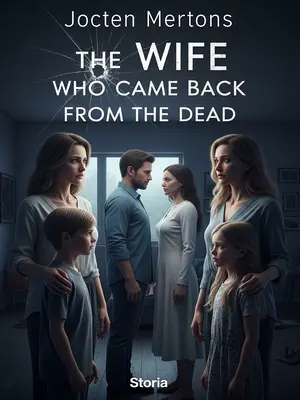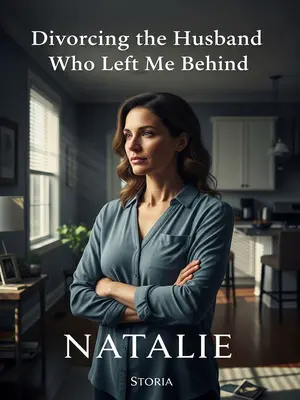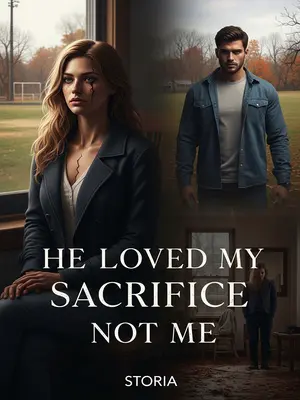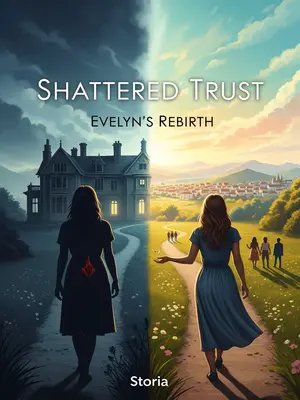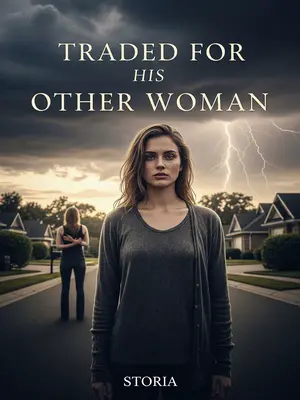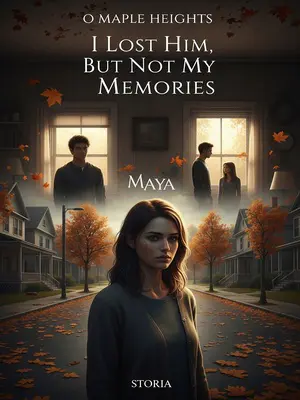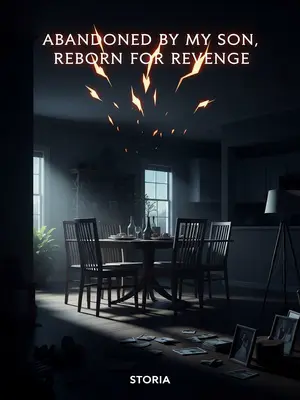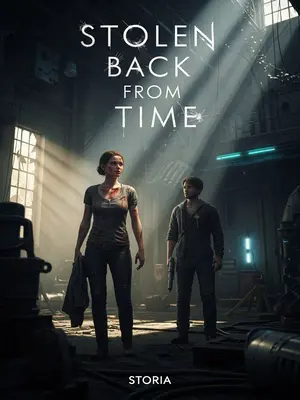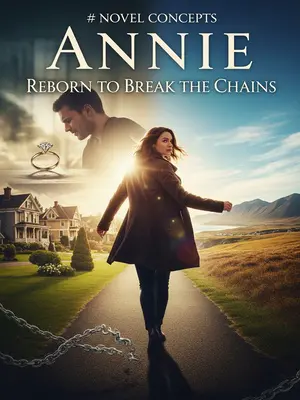Chapter 4: The Blood Trail to Maple Ridge
In the center stood an older man, stern-faced, wearing a dark suit. His eyes were cold, his mouth set in a hard line. I didn’t recognize him, but something about him made my skin crawl.
"Who is this?" I pointed to the man, curiosity gnawing at me. Grandma Elsie’s hands trembled as she wiped the glass. She glanced at me, her eyes full of something like dread. She set the photo down, face down on the table, and the candle flame flickered.
She turned the frame face down on the table, startling the candle flame. The flame danced, casting long shadows on the walls. The room felt colder, smaller.
"That is the Old Keeper. Back then, he controlled the town’s lifeblood, which was the Lake God Chapel on the mountain. Only he could communicate with the Lake God. Folks depended on him for fish fry; all the town’s fish were given and sold by him." Her voice was soft, almost reverent. The Old Keeper was a legend in Maple Hollow—part priest, part king, part boogeyman. People still whispered his name at night.
I thought to myself, this was a bit like my sister now. Marlene had taken over many of the Old Keeper’s duties—organizing the fish sales, settling disputes, keeping the peace. I wondered if she ever felt the weight of it all.
The town has a weak signal, very isolated, almost cut off from the world. Cell phones rarely worked, and the internet was slow as molasses. We relied on word of mouth, on letters and old-fashioned phone calls. It made the town feel both safe and suffocating.
Though it produces lots of fish, all buying and selling depends on the council president and my sister. They controlled the money, the shipments, the deals with outsiders. Folks grumbled, but nobody challenged them. It was just the way things were.
Folks never complain, since they’re always paid well. The money was good, better than most places. It kept the town afloat, kept people from asking too many questions.
"Grandma Elsie, is the Old Keeper still alive?" I couldn’t shake the feeling that he was still out there, watching us from the shadows. Grandma Elsie smiled, a sad, knowing smile.
Grandma Elsie suddenly smiled. "Back then, we all thought the Old Keeper was blessed by God, would live forever. Who knew, he didn’t even live as long as me." She chuckled, the sound brittle as dry leaves. "He was just a man, after all."
"Grandma Elsie, can you come up the mountain with us?" I asked, my voice barely above a whisper. I needed her strength, her wisdom. She looked at me for a long moment, then nodded.
I thought Grandma Elsie would be afraid, but she just looked at me calmly. "Did you tell your husband about this?" She always thought of the practical things, even in the face of the impossible. I nodded, though the truth was more complicated.
"I wrote a letter." I’d scribbled a note the night before, hoping it would reach him in time. I doubted it would, but it was all I could do.
Grandma Elsie nodded, breathing heavily, slowly got up, and leaning on her cane, walked to the door. Her house faced Maple Ridge. She stared out at the mountain, eyes narrowed. The wind rattled the windows, and I shivered.
"Maggie, why do you think none of the men ever come home?" Her question caught me off guard. I’d never really thought about it—never wanted to. The truth was too painful.
I froze. I’d never thought about this. My husband wrote me every year and sent money. In a way, I’d almost forgotten him. The letters came like clockwork, always the same—news of work, promises to come home soon. But the years passed, and he never did.
Grandma Elsie said, "When the Old Keeper died, I got a high fever, sick for half a month. When I woke up, the town had changed completely. All these years, I always felt something was wrong, like the lakes—calm on the surface, but with undercurrents. Once they have kids, men have to leave the mountain. All these years, I’ve never seen a man return. Maggie, is your husband really still alive?" Her words sent a chill down my spine. I thought of the empty chair at the kitchen table, the dusty boots by the door. I didn’t know what to say.
My breath caught, confused. "What do you mean?" I searched her face for answers, but she only shook her head.
She sniffed the air and asked, "What do you smell?" She closed her eyes, inhaling deeply. I tried to catch whatever she sensed, but all I could smell was the lake, the mud, the faint tang of old blood.
I copied her, sniffing the air, and smelled the damp fishy scent all over town. She faced the mountain, mysterious. "The fishy smell is strong, enough to cover many other smells. I smell something hidden beneath it, coming from Maple Ridge. The whole mountain reeks of blood."
I stood there, not knowing what to say. Grandma Elsie closed the door, returned to the candlelight, the flames flickering on her wrinkled face, making her seem even more mysterious. She looked older than ever, her eyes lost in memories. I wanted to ask more, but the words stuck in my throat.
She sighed. "Now, Lila Mae’s affair is like a gust of wind, finally stirring up the water’s surface. If you hadn’t come to me, I would have gone up the mountain myself. At my age, I’ve lived enough." She squeezed my hand, her grip surprisingly strong. I felt a surge of gratitude—and fear.
I only wanted to find Lila Mae; I didn’t care about anything else. As I was leaving, Grandma Elsie called me back: "Maggie, are you really afraid of going into the woods? Haven’t you seen someone come out before?" Her words stopped me cold. I searched my memory, trying to recall. A flicker of something surfaced—a memory, half-remembered, of someone stepping out of the trees.
My hand on the door tightened suddenly. Yes, I was too young then, but now I remember—it felt like a hallucination. I saw a figure—my sister, maybe—emerging from the woods, eyes wide and empty. I’d always told myself it was a dream, but now I wasn’t so sure.
I had once seen my sister come out of the woods with my own eyes. The memory hit me like a wave. She was younger then, hair tangled, clothes torn. She never spoke of it, and I never asked.
On the way back, I felt compelled to visit the lake where Lila Mae had fallen. The sky was heavy with clouds, the air thick with the promise of rain. I walked the familiar path, my feet dragging.
The weather was bad, a drizzle began to fall, making the lake’s surface tremble. The drops fell in slow motion, rippling across the water. The lake seemed alive, restless.
I called softly, "Lila Mae." My voice barely carried over the wind. I waited, listening for a reply, but all I heard was the patter of rain.
Soon, my hair was wet and stuck to my face. I couldn’t hold back anymore and cried softly. The tears mixed with the rain, running down my cheeks. I hugged myself, shivering in the cold.
Lila Mae was my daughter, my life. Everything I’d ever done was for her. The thought of losing her was more than I could bear.
My parents died early. After my sister married Tom, I was the only one left at home. The house felt empty, too quiet. I filled it with music, laughter, anything to keep the silence at bay. Lila Mae was my anchor, my reason to keep going.
My husband went away for work and never came back. His absence was a hole that never healed. I told myself he’d return one day, but deep down, I knew better.
There was a time when I wanted to end my life, but Lila Mae kept me going. Her laughter, her stubbornness, her joy—they pulled me back from the edge more times than I could count.
On the water, a dark shadow slowly approached. My eyes widened. Instead of backing away, I stepped forward. The shadow glided just beneath the surface, silent and smooth. My heart pounded, but I couldn’t look away.
Was this Shadow, the one Lila Mae mentioned? The thought sent a chill through me. I knelt by the water, reaching out with trembling fingers.
I touched the water with my fingertip, watching the shadow get closer and closer. Just as I was about to touch it, a voice came from behind: "Maggie, come home." Marlene’s voice snapped me out of it. I turned, blinking away tears, and when I looked back, the shadow was gone.
It was my sister. When I turned around, there were only raindrops on the water—nothing else. The lake was empty, the shadow vanished. I stood, wiping my eyes, and followed Marlene home.
I followed my sister home. There was a strange fragrance in the air, making my mouth water, better than any food I’d ever smelled. The scent drifted through the neighborhood, rich and savory. My stomach growled, despite everything.
What delicious food was the neighbor making in the middle of the night? I wondered if someone was celebrating, or if it was just another strange happening in Maple Hollow.
The fish child was sleeping in the tank, his face more and more human, his body seeming to shrink. He curled up at the bottom, eyes closed, gills fluttering gently. I watched him for a long time, searching for any sign of Lila Mae in his features.
As usual, I went to the pond to check on the fish creatures. No matter what, they were connected to Lila Mae; maybe I could find her through them. The pond was empty. I stared into the water, searching for any sign of movement. The surface was still, the weeds undisturbed. My heart sank.
At the same time, the neighbor’s fragrance broke through the rain and lingered around me. The smell was stronger now, almost overwhelming. I followed it, my feet moving of their own accord.
Greedy voices rang out: "Does eating this fish really cure my illness?" I heard them through the open window, voices raised in excitement and greed.
"Of course. This fish is from the Lake God. Eat it, maybe you’ll live forever." The words sent a chill down my spine. I remembered the old stories—how the Lake God’s fish could heal any wound, grant any wish.
"Son, eat more to grow strong and get a girlfriend." Laughter echoed from the kitchen, mingling with the clatter of plates and forks.
"These eyeballs are too tough to chew. Are they not cooked?" A child’s voice, whiny and disappointed. The adults laughed, but there was an edge to it—a hunger that made my skin crawl.
In an instant, I felt ice cold all over. I rushed madly into the neighbor’s house. A group of people were gathered around a big pot, steam rising—the source of the smell. The sight shocked me. The kitchen was crowded, the table piled high with bowls of steaming fish. The air was thick with the scent of blood and spices.
Porcelain bowls held pieces of fish meat, brownish in color. They were feasting. When they saw me, they put down their forks. Their faces went pale, eyes wide with guilt. The laughter died, replaced by uneasy silence.
Seeing my sister behind me, their expressions changed. The neighbor smiled nervously. "Marlene, still up so late?" He tried to sound casual, but his voice trembled. The others avoided her gaze, shifting in their seats.
My sister sneered. "Where did you hear this is the Lake God’s child? It’s a lake spirit’s." Her voice was cold, cutting through the tension like a knife. The room fell silent.
The crowd realized, desperately trying to make themselves vomit. An aunt choked, tears streaming. "The whole town said it’s the Lake God’s child." She clutched her stomach, face twisted in horror. The others followed suit, some running for the bathroom, others clutching their mouths.
My sister steadied my faltering body, looking at them as if they were already dead. She wrapped an arm around my shoulders, her grip steady and comforting. Her eyes were hard, unforgiving.
"People are always ruined by their own selfishness." Her words echoed in the silence. I looked at the faces around me, saw the fear, the regret, the hunger. I wondered if any of us were truly innocent.
If I couldn’t find Lila Mae, I would die. My sister probably understood me; she rubbed my shoulder and, amid their coughing, decided, "We’ll go up the mountain tomorrow." Her words were final, leaving no room for argument. I nodded, hope and dread warring in my chest.
Early next morning, Grandma Elsie waited for us at the foot of the mountain. She stood beneath the old oak tree, cane in hand, eyes sharp and clear. The sun hadn’t yet risen, and the air was thick with mist.
The whole town knew we were going up, watching us curiously. Someone stopped my sister. "Marlene, if you don’t come back, who’ll sell the fish?" A man in a plaid shirt called out, his voice tinged with fear. Marlene waved him off, her jaw set.
My sister waved her hand. "Tom’s here." She nodded toward Tom, who stood at the edge of the crowd, hands in his pockets. He looked as nervous as the rest of us.
My brother-in-law stood silently at the back. His eyes met mine, full of worry and something else—something I couldn’t name.
We walked up the mountain path, tall trees on both sides, wild grass everywhere, birds unafraid of people. The woods were quiet, the only sounds our footsteps and the distant call of a woodpecker. The path wound upward, roots and rocks tripping us at every turn.
Lila Mae’s blood trail disappeared after we entered the woods. We wandered aimlessly, following a single path. The trail vanished beneath the leaves, leaving us to guess our way forward. I kept my eyes on the ground, searching for any sign of her passing.
After about half an hour, we saw a raised mound ahead. I was about to go there when I felt something crawling nearby. The hairs on my arms stood up. I froze, listening to the faint rustle in the underbrush. Something was watching us.
That faint rustling sound—a black shadow at the edge of my vision. It darted between the trees, quick and silent. My heart pounded, and I reached for Grandma Elsie’s hand.
I quickly grabbed Grandma Elsie and my sister. We huddled together, eyes scanning the shadows. The fish child whimpered in Marlene’s arms, his eyes wide with fear.
The fish child seemed to sense something and began to wail, his voice hoarse and unpleasant. My sister soothed him while watching the surroundings. She rocked him gently, whispering soft words. The wailing faded, replaced by a low, guttural hum.
Grandma Elsie comfortingly patted my hand, took a silver cross from her bag, covered with dense carvings. She held it up, the silver catching the weak sunlight. The carvings glowed faintly, casting strange patterns on the ground.
She stood for a while. The cross slowly glowed, then quickly dimmed. The light faded as quickly as it had come. Grandma Elsie frowned, tucking the cross back into her bag.
Grandma Elsie said, "This place isn’t clean. The cross absorbed some evil. We must hurry." Her voice was urgent, her grip on my arm tight. We picked up the pace, moving deeper into the woods.
Up close, it wasn’t a mound, but a grave. The earth was freshly turned, the grass trampled. A simple headstone marked the spot, its letters worn by time.
The tombstone read: [Old Keeper’s Grave]. The name sent a shiver down my spine. I glanced at Grandma Elsie, who looked grim.
Grandma Elsie frowned, went forward, pinched some dirt, and smelled it. After a while, she picked up a shovel and started digging. She worked slowly, her hands shaking. Marlene handed me a shovel, and together we dug, the earth cold and heavy.
"Let’s see if this is really the Old Keeper’s grave." Her voice was steady, but I could hear the doubt beneath it. We dug until the shovel hit wood.
She was too old to dig alone; my sister was holding the fish child, so I helped. My arms ached, blisters forming on my palms. I tried not to think about what we’d find.
A fine coffin appeared before us. The wood was old, splintered, the lid covered in moss. I wiped the dirt away, heart pounding.
I felt uneasy. Grandma Elsie gave a gentle push; the lid fell, raising dust. The dust rose in a thick cloud, making us cough. When it cleared, we peered inside.
Inside was no corpse, but a set of earthen stairs, pitch black below. The stairs spiraled downward, disappearing into darkness. A cold draft rose from below, carrying the scent of damp earth and something rotten.
The three of us exchanged glances. To avoid being caught by nightfall, I had brought flashlights for everyone, which came in handy now. We clicked them on, the beams cutting through the darkness. I swallowed hard, steeling myself for what lay ahead.
The passage smelled terrible, pitch dark, but luckily the flashlights were fully charged. The air was thick, hard to breathe. The walls were slick with moisture, the floor uneven beneath our feet.
At the end was a room-like earthen chamber. The chamber was small, the walls lined with shelves of old books and jars. A wooden table stood in the center, covered in dust.
Opening the wooden door, the choking dust made me cough. I covered my mouth, blinking away tears. The fish child whimpered, burying his face in Marlene’s shoulder.
The fish child was already asleep, lying in my sister’s arms, trusting her deeply. She stroked his back, humming softly. I wondered how she could be so calm.
Grandma Elsie strode to a table, on it a photo like those at her house. She picked it up, wiping away the dust. The faces were familiar—my parents, Marlene, and the Old Keeper.
Besides that, there were several other photos. I sorted through them, searching for any clue. One caught my eye—a man and a woman, strangers in this place.
One showed the Old Keeper and townsfolk. Another caught my eye. The man was short, with delicate features, the woman tall and sharp-eyed. They stood on either side of the Old Keeper, their faces set in grim determination.
On either side of the Old Keeper stood a man and a woman, obviously not locals, but like people from a wealthy family in old times. Their clothes were finer, their posture straighter. I wondered what brought them to Maple Hollow.
